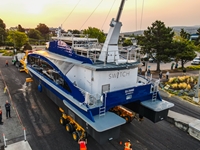In June 2023 we spoke to The Passenger Vessel Association’s Foghorn Magazine about trends we are seeing around the world when it comes to propulsion systems with many operators moving to both improve efficiency and reduce emissions. Below is a short excerpt from that article.
Foghorn Magazine:Do you see a trend in the types of propulsion systems chosen for new builds in the industry? Are many people sticking with diesel or is there a shift to more environmentally friendly options?
Incat Crowther:For long-term, environmentally and commercially sustainable operations, the right balance of operational efficiency, smart design solutions and tailored propulsion systems are required. So when we evaluate what type of propulsion system to incorporate into a vessel’s design Incat Crowther’s approach is to look at it from a holistic perspective. This can include a fleet assessment and route analysis, including the speeds that are required and the infrastructure available. This process ensures we are designing the most efficient system that is tailored specifically to the needs of that vessel.
It’s important the passenger ferry industry creates a compelling alternative to more carbon-intensive modes of transport such as car travel. By optimising operations, we can make passenger vessels more attractive and deliver significant environmental benefits.
Foghorn Magazine:Do you think operators with large fleets, or companies that own operations in multiple locations, will consider diversifying their fleets when it comes to propulsion methods?
Incat Crowther: We believe that the design of any vessel, including its propulsion system, should be tailored specifically to the route and operational requirements of that vessel. This approach will ensure operators gain operational efficiencies and reduce maintenance costs once their vessels are deployed. We use our experience as a world leader in the design of efficient commercial vessel designs to offer smart sustainable design solutions, while incorporating commercially viable aspects of alternative fuels and propulsion to ensure operators have vessels that are specifically tailored to their operations.
Foghorn Magazine:Based on the trends you’ve seen in the past few years, what do you expect will be the trend for propulsion system choices in the coming years in the passenger vessel industry?
Incat Crowther: The shipping industry will continue to drive for reductions in emissions in line with the Paris climate change agreement. We believe this will mean operators seek out energy savings, including hull-design and route optimisation on current vessels, and then turn to hybrid, electric and future fuel-powered propulsion systems. The approach to reducing emissions in the marine industry should focus on the right goals, processes and partners who can deliver a commercial, technically, and environmentally feasible solution.

